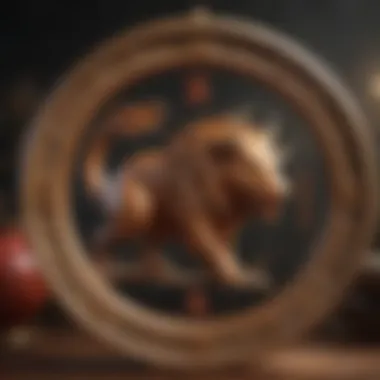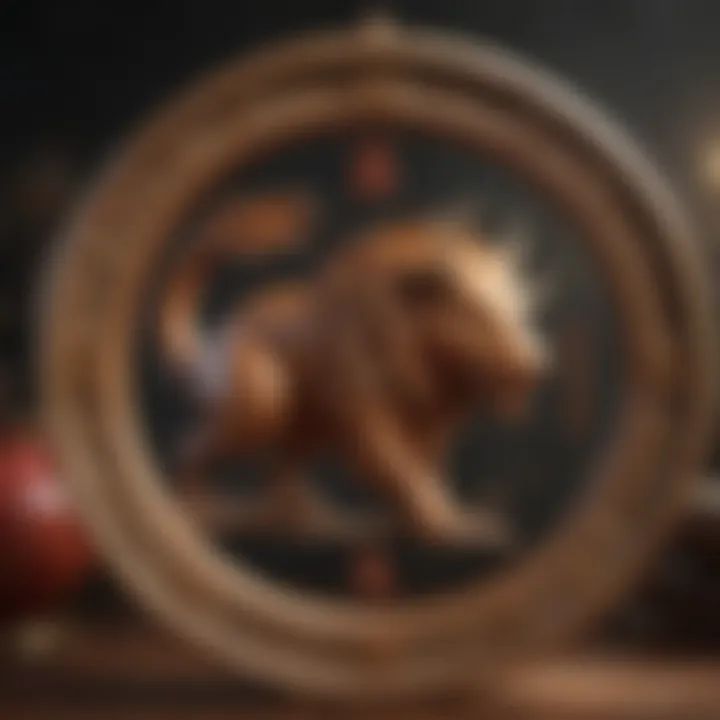Decoding the Chinese Birth Chart: A Comprehensive Guide


Intro
Understanding the complexities of the Chinese birth chart involves much more than simply memorizing zodiac signs and their corresponding elements. This guide aims to provide a comprehensive framework for deciphering the layers that shape an individual's life and personality according to Chinese astrology. By delving into the fundamentals, we will explore how the components of birth charts intertwine to reveal insights into destiny and compatibility.
A foundational aspect of this exploration is the concept of astrology. This ancient practice not only examines individual circumstances but also connects them to larger cosmic phenomena. No longer confined to merely predicting fortune, astrology serves as a lens through which we can view personal growth, challenges, and relationships.
As we engage with this guide, it is crucial to keep in mind the intricacies of the Chinese birth chart reflect centuries of tradition and thought. Consequently, both novices and seasoned astrologers may find valuable insights that can enhance their understanding of themselves and their interactions with others.
Astrological Concepts
Definition of Key Terms
To engage meaningfully with the Chinese birth chart, it is essential to clarify several key terms. First, Zodiac Signs represent distinct personality traits and life challenges based on the year of birth. Each sign corresponds to specific characteristics and influences that shape one’s fate. Additionally, the Five Elements—Wood, Fire, Earth, Metal, and Water—are central to determining how energies interact within the chart, profoundly affecting individual attributes and tendencies.
Historical Background of Astrology
Astrology has its roots deep within Chinese history. The practice has evolved over millennia, adapting and integrating various cultural influences. From the Han Dynasty onward, the Chinese adopted astrology to help guide decisions in agriculture, governance, and personal endeavors. Notably, the intertwining of Confucian, Taoist, and Buddhist philosophies integrated ethical considerations into astrological practices, giving it a unique character distinct from Western astrology.
Overview of Different Astrology Branches
In exploring the vast field of astrology, one must acknowledge the branches that have emerged over time. Chinese astrology stands alongside Western and Vedic astrology, each with its own methodology and interpretative structures. While Western astrology hinges on the positions of celestial bodies at the time of birth, Chinese astrology places significant emphasis on the lunar cycles and the interplay of elements and zodiac signs during specific years. This framework offers a different perspective and depth to understanding human experience.
Zodiac Signs Exploration
In-Depth Analysis of Each Sign
Each Chinese zodiac sign corresponds to a year in a twelve-year cycle. The signs include Rat, Ox, Tiger, Rabbit, Dragon, Snake, Horse, Goat, Monkey, Rooster, Dog, and Pig. Understanding these signs requires delving into the distinctive traits attributed to each:
- Rat: Resourceful and clever
- Ox: Dependable and strong
- Tiger: Courageous and confident
- Rabbit: Gentle and compassionate
- Dragon: Ambitious and assertive
- Snake: Wise and insightful
- Horse: Energetic and free-spirited
- Goat: Artistic and nurturing
- Monkey: Intelligent and curious
- Rooster: Loyal and observant
- Dog: Loyal and protective
- Pig: Generous and compassionate
Personality Traits and Characteristics
Each sign illustrates not only general traits but also compatibility with others. For example, Rats may find themselves most compatible with Dragons and Monkeys, while Dogs tend to bond well with Horses and Rabbits. Recognizing these compatibility patterns allows for deeper personal insights and better relationship dynamics.
Historical and Mythological Connections
The Chinese zodiac is steeped in mythological narratives, which help explain the qualities ascribed to each sign. For example, the story of the Great Race that determined the zodiacs' order plays a crucial role in shaping the understanding of these signs. Such stories contribute not only to the enjoyment of the art but also to the depth of interpretation each sign offers.
Celestial Events
Major Cosmic Phenomena
Celestial events such as eclipses, solstices, and lunar phases significantly influence astrological readings. Each event has a different meaning, focusing the energies of specific elements or signs. Recognizing these events provides additional layers of understanding when interpreting the birth chart.
Impact of Celestial Events on Astrology
The relationship between celestial phenomena and personal attributes is undeniable. Major events can affect how one experiences their traits, challenges, and potential. For instance, a solar eclipse might signify a time for reflection and transformation, impacting multiple aspects of an individual's birth chart.
Rituals and Practices During Celestial Events
Engaging in rituals during celestial events enhances the connection to astrological wisdom. Many practitioners suggest meditation or particular prayers that align with the energies of the specific event, allowing for greater personal insight and growth.
Astrology is more than a predictive tool; it serves as a reflection of the self and the universe at large, guiding individuals in their personal journeys.
Through this guide, the intricate world of the Chinese birth chart unfolds. As we proceed, deeper exploration into its elements, readings, and practical application awaits.
Preface to Chinese Astrology
Understanding Chinese astrology is essential for anyone interested in the nuances of the Chinese birth chart. This ancient system analyzes individual characteristics, societal roles, and even determines life pathways based on various astrological elements. The learning curves can be steep, but the insights gained are profound.
Historical Context of Chinese Astrology
Chinese astrology has a rich history that stretches back thousands of years. It is intertwined with traditional Chinese philosophy, belief systems, and the natural world. The ancient Chinese cultivated knowledge from observing celestial patterns and integrating these observations into cultural practices.


Historically, this system was utilized for various purposes, including agricultural planning, public ceremonies, and even political decisions. The Chinese zodiac, developed around the Han Dynasty, organizes each year into an animal sign, influencing personal identity based on the time of birth.
Understanding the historical context reveals how deeply embedded astrology is in Chinese culture. Each zodiac sign holds particular significance and reflects varying traits and attributes. This context enriches the interpretation of one's birth chart, adding layers of meaning and complexity that resonate with followers.
The Role of the Chinese Birth Chart
The Chinese birth chart serves as a unique framework for self-discovery. Unlike Western astrology, which focuses mainly on sun signs, the Chinese system incorporates multiple factors, including the lunar calendar and five elements. Each individual's birth chart is shaped by their specific time, date, and place of birth, which provides a personalized analysis.
Every chart provides insights into various aspects of a person's life. It includes aspects of personality, career, relationships, and even challenges. The birth chart functions as a blueprint, guiding individuals toward understanding their strengths and weaknesses. This can lead to informed decision-making in various life areas.
The Chinese birth chart is not just a reflection of destiny; it serves as a tool for personal growth and awareness.
As one delves into their birth chart, it becomes a journey of self-reflection and empowerment. The information gleaned offers clarity, urging individuals to leverage their elemental strengths and understand their inherent traits. Thus, it is instrumental in navigating both personal and social realms effectively.
Understanding the Chinese Zodiac
Understanding the Chinese Zodiac is pivotal in grasping the full scope of Chinese astrology. The Chinese Zodiac comprises twelve distinct animals, each representing unique traits and character attributes. This section serves to base your knowledge in interpreting how these animals influence personal characteristics and destiny. The interplay between zodiac signs and personal elements reveals insights about life choices, relationships, and even career paths.
The benefits of studying the Chinese Zodiac include enhanced self-awareness, better relationship compatibility, and a foundation for personal growth. Recognizing your zodiac sign allows you to see your strengths and weaknesses more clearly. It can guide you through various life challenges and decisions. Understanding the dynamics of the zodiac can also help you navigate interpersonal relationships, both personal and professional.
The Twelve Animals of the Zodiac
The twelve animals of the Chinese Zodiac are Rat, Ox, Tiger, Rabbit, Dragon, Snake, Horse, Goat, Monkey, Rooster, Dog, and Pig. Each animal has its own characteristics and traits that influence the personalities of those born under that sign. The cycle of the Zodiac operates in a repeating twelve-year rhythm. Knowing which animal represents your birth year can provide a framework for self-understanding and growth. Here is a brief overview of each zodiac animal:
- Rat: Intelligent, adaptable, quick thinkers.
- Ox: Dependable, diligent, focused, and strong.
- Tiger: Courageous, competitive, and strong-willed.
- Rabbit: Gentle, quiet, and kind-hearted.
- Dragon: Energetic, charismatic, and ambitious.
- Snake: Wise, mysterious, and intuitive.
- Horse: Free-spirited, energetic, and intelligent.
- Goat: Artistic, calm, and gentle.
- Monkey: Playful, curious, and clever.
- Rooster: Observant, hardworking, and confident.
- Dog: Loyal, honest, and compassionate.
- Pig: Generous, compassionate, and sociable.
Understanding these animals' nature helps in revealing deeper connections between personality traits and life's opportunities. Thus, choosing to embrace one's sign can lead to enriched life experiences.
Characteristics of Each Zodiac Sign
Each zodiac sign possesses distinct qualities that shape the individuals born under them. These characteristics can be classified into various dimensions such as:
- Emotional Traits: How individuals express their feelings.
- Behavioral Patterns: Actions that define daily routines.
- Interpersonal Skills: How one interacts with others.
For example, those born under the Dragon are often seen as powerful leaders, brimming with creativity and ambition. In contrast, Rats might be more flexible and quick-witted, making them adaptable in various situations. Recognizing how these traits manifest in each zodiac sign shows a path for personal and relational growth. This understanding adds layers to one's self-awareness and helps devise strategies for overcoming challenges presented by one’s nature.
Understanding the Chinese Zodiac is not simply about predicting personality traits; it is also about recognizing the potential for growth and change within oneself.
In summation, understanding the Chinese Zodiac is integral for interpreting an individual’s characteristics and exploring the rich tapestry of personal destiny. Armed with this knowledge, you can more effectively navigate the intricate dynamics of life.
The Five Elements Theory
The Five Elements Theory plays a crucial role in understanding the dynamics of the Chinese birth chart. This theory, which consists of Wood, Fire, Earth, Metal, and Water, provides insights into various aspects of an individual's character, destiny, and interactions within the cosmos. Through the lens of these elements, one can decipher the complexities of their astrological makeup. The significance here is multifaceted, affecting personal traits, relationships, and even career paths.
Foreword to the Five Elements
The Five Elements represent fundamental forces that interact in a continuous cycle. Each element embodies distinct characteristics that influence human behavior and personality traits. These elements are not merely abstract concepts; they manifest in real-world relationships and offer practical applications in daily life. Here is a brief overview of each element:
- Wood: Associated with creativity, growth, and flexibility.
- Fire: Represents passion, energy, and enthusiasm.
- Earth: Symbolizes stability, nurturing, and practicality.
- Metal: Reflects structure, discipline, and strength.
- Water: Represents adaptability, intuition, and fluidity.
Understanding these elements gives a deeper comprehension of one’s strengths and weaknesses. In analyzing a Chinese birth chart, the coexistence and balance of these elements are paramount.
Interactions Among the Elements
The interactions among the Five Elements create a dynamic system of balance and conflict. Each element either supports or restricts others, leading to varying effects on personality and life situations.
The Generating Cycle
In this cycle, one element enhances another:
- Wood fuels Fire.
- Fire creates Earth (ash).
- Earth bears Metal.
- Metal carries Water (in terms of condensation).
- Water nourishes Wood.
The Controlling Cycle
Conversely, this cycle indicates how an element can restrict another:


- Wood parts the Earth (roots can disturb soil).
- Fire melts Metal.
- Earth absorbs Water.
- Metal cuts Wood.
- Water extinguishes Fire.
These interactions are essential to individual astrology. By understanding these cycles, one can better interpret not only their chart but also the charts of others around them. The elements' balance can reveal how well someone may navigate relationships, cope with challenges, or pursue happiness.
Combining Zodiac Signs and Elements
Understanding the synthesis of Zodiac signs and elements is crucial for grasping the depth of the Chinese birth chart. Each individual’s characteristics, behaviors, and life path can be influenced by the interplay between their zodiac sign and the corresponding elemental forces. The combination of these influences helps to unravel complexities of personality and aspects of destiny.
The relevance of this topic cannot be overstated. Different elements—Wood, Fire, Earth, Metal, and Water—imbue individuals with distinct traits, largely shaping how they express their zodiac sign's inherent qualities. The deeper one delves into these combinations, the better equipped they become in navigating personal challenges and enhancing growth opportunities. Thus, mastering this concept provides both practical benefits and deeper insights into personal dynamics.
How Elements Influence Zodiac Traits
Each element brings its own attributes to the Zodiac signs, greatly modulating their characteristics. For example:
- Fire: Associated with dynamism and passion, it enhances traits such as courage and impulsivity within a Zodiac sign. A Fire element can make a person more adventurous and spontaneous.
- Earth: This element brings stability and practicality. Zodiac signs influenced by Earth often show common sense and a grounded nature, leading to responsible behaviors.
- Metal: This element offers clarity and precision. Zodiac signs combined with Metal tend to experience traits such as determination and resilience—this makes them focused on their goals.
- Water: Known for its adaptability and fluidity, Water can enhance emotional depth and intuition within a sign, fostering creativity and empathy.
- Wood: This element represents growth and vitality. It imbues Zodiac signs with traits like optimism, creativity, and a strong desire for improvement.
Overall, the interaction between elements and Zodiac traits illustrates a unique personality blend, affecting interpersonal relationships, career paths, and life decisions.
Understanding Personal Elemental Composition
To fully comprehend one’s elemental composition, one must analyze the specific zodiac sign and its associated elements. The personal elemental composition can reveal the dominant elements in an individual’s birth chart, which influences their reactions in various situations.
Two significant factors emerge in this understanding:
- Dominant Element: The most pronounced element in a birth chart highlights primary characteristics. If a person possesses a dominant Water element, they may find themselves thriving in emotional or artistic endeavors.
- Secondary Elements: Elements that play a supportive role can add complexity and layers to overall personality. For example, an individual with a dominant Earth element and a secondary Fire element may exhibit balance between practicality and enthusiasm.
In summary, combining Zodiac signs with elements provides essential insights into personal traits and life experiences. This understanding can serve as a foundation for personal growth and deeper connections with others.
Components of the Chinese Birth Chart
Understanding the components of the Chinese birth chart is essential for anyone looking to delve into the intricacies of Chinese astrology. This section unveils the foundational elements that make up the birth chart, specifically the Heavenly Stems and Earthly Branches. Grasping these elements helps in interpreting the nuances of individual lives, including personality traits, potential career paths, and relational dynamics.
Heavenly Stems and Earthly Branches
Heavenly Stems and Earthly Branches represent the dual framework on which the Chinese cosmic system operates. The Heavenly Stems comprise ten characters, while the Earthly Branches consist of twelve. When combined, they form a 60-year cycle known as the Sexagenary Cycle. Each Stem and Branch has a unique energy associated with it, creating a rich tapestry of influences.
The importance of these elements lies in their categorization of time and personality. For instance, each Branch corresponds to a specific zodiac sign, while the Stems are connected to the Five Elements. This combination lays the groundwork for a detailed understanding of an individual's traits and karmic influences.
When exploring your own birth chart, the positioning of the Stems and Branches will reveal key insights. This includes:
- Personal attributes and tendencies
- Strengths and potential weaknesses
- Timing of life events
Understanding these components allows for a more nuanced interpretation of one's existence. Many practitioners emphasize how these aspects influence not just the individual but also their surroundings.
The Importance of Time of Birth
The timing of one's birth is a critical component of the Chinese birth chart. Unlike Western astrology, which primarily focuses on the date of birth, Chinese astrology also emphasizes the exact time. This time factor adds another layer to the reading of one's chart. It determines the placements of the Heavenly Stems and Earthly Branches, influencing the resulting characteristics attributed to the individual.
Each two-hour interval in a day, known as a
Analyzing Your Birth Chart
Analyzing your birth chart is a central theme in understanding Chinese astrology. It offers a window into one's personality, strengths, weaknesses, and potential life path. The Chinese birth chart is not merely a tool for divination; it serves as a guide that can illuminate how personal traits are intertwined with celestial influences.
When delving into your birth chart, you will encounter Heavenly Stems and Earthly Branches, the fundamental components that structure your chart. Each element carries its own significance. The analysis provides insights on how these elements interact and shape your character.
An important benefit of analyzing your birth chart is in self-discovery. It encourages individuals to explore their inner selves, understanding why they respond to situations in certain ways. For example, knowledge of one’s zodiac sign can bring clarity to interpersonal relationships, revealing potential areas of conflict or connection.
Another consideration is timing. The significance of birth time cannot be overstated. It influences how the various components within the birth chart align. This nuanced understanding can aid in making informed decisions in life, career, and relationships, ultimately leading to a more enriched experience.
"Astrology does not define who you are but offers a mirror to your potential."
In this light, analyzing your birth chart becomes an act of empowerment. It emphasizes the personal agency one holds in navigating life. The information derived from a birth chart can thus inform practical decisions and strategic planning.


Interpreting Your Zodiac Sign
Your zodiac sign is one of the primary focal points in the Chinese birth chart, representing essential characteristics and tendencies. Each of the twelve zodiac animals embodies specific traits that influence personal behavior and disposition.
Knowing your zodiac sign helps in recognizing recurring patterns in your life. For instance, a person born under the sign of the Dragon may exhibit traits like charisma and ambition. Conversely, someone of the Pig sign could be more associated with benevolence and practicality. By understanding these signs, individuals can comprehend their strong points and potential challenges more clearly.
Additionally, recognizing how your sign interacts with those of others can gear you towards enhancing relationships. Compatibility can often be drawn from these zodiac interactions, creating a framework for understanding both personal and professional relationships better.
Understanding Elemental Influence
Elemental influence is a crucial part of the Chinese birth chart, informed by the five elements: Wood, Fire, Earth, Metal, and Water. Each element plays a role in shaping the traits associated with your zodiac sign, lending further depth to analysis.
The elemental interactions provide a dynamic perspective. For instance, a Wood element might nurture a Water element, leading to growth and creativity. Conversely, the conflict between Fire and Water suggests potential struggle in one’s life circumstances. By clarifying your elemental influence, you understand challenges that may arise and how to navigate them effectively.
Also, recognizing the dominant element in your life can guide your path. If your elemental composition is predominantly Metal, for example, it might indicate a drive for discipline and structure. Knowing this allows you to make choices that align more closely with your intrinsic nature.
By understanding these elements fully, individuals can enhance their journey of self-awareness in the realm of Chinese astrology. This knowledge serves as a pillar for personal development and can be applied in various aspects of life to maximize potential.
Practical Applications of the Chinese Birth Chart
The practical applications of the Chinese birth chart offer a wealth of insights into personal growth, relationships, and life journey. Understanding these applications is essential for harnessing the power of this ancient astrological system. By integrating one’s birth chart into daily life, individuals can unlock deeper levels of self-awareness and enhance their decision-making processes.
One key advantages include the ability to identify and strengthen personal traits. For example, if your chart highlights a strong Metal element, this can signify a propensity for decisiveness and resilience. By recognizing these traits, one can consciously cultivate them in personal or professional settings. Conversely, knowing where weaknesses may arise, such as potential struggles with change, allows for proactive personal development.
Additionally, the birth chart can inform career choices. By understanding one’s elemental composition and zodiac characteristics, individuals can align their professional paths with their natural inclinations. Moreover, the insights gained may unveil ideal work environments or roles that resonate with one's intrinsic qualities.
Another notable aspect is the impact of astrology on relationships. By comparing birth charts, individuals can assess compatibility and discover potential challenges. This understanding fosters healthier interactions, as it emphasizes communication styles and emotional needs based on astrological traits.
Criticisms and Limitations of Chinese Astrology
Chinese astrology, while rich in tradition and cultural significance, is met with skepticism by various audiences. It is crucial to examine these criticisms to create a balanced understanding of this ancient practice. This section will address specific skeptical perspectives and explore how cultural contexts shape the relevance of Chinese astrology today.
Skeptical Perspectives
Critics often argue that Chinese astrology lacks scientific grounding. They emphasize that astrological predictions and interpretations are generally anecdotal. Numerous studies have failed to find statistical correlations between astrological signs and personality traits or life outcomes. Furthermore, skeptics point out that many people may experience confirmation bias when assessing their astrological predictions. They tend to remember accurate predictions while dismissing the false ones. This results in an inflated perception of accuracy.
Another often-cited criticism pertains to the reliance on birth dates. Some contend that a person's individuality encompasses far more than their birth year, month, day, and hour. Environmental factors, life experiences, and genetics contribute significantly to personal traits. Thus, critics argue that Chinese astrology oversimplifies complex human behaviors, rendering it less applicable in understanding people.
"The zodiac is a framework; correlation does not imply causation. Humans are more than the sum of their astrological parts."
— A prominent skeptic on astrology.
Cultural Context and Relevance
Despite the criticisms, it is essential to recognize the cultural context in which Chinese astrology operates. In Chinese culture, astrology has been a part of social fabric for centuries. It plays a significant role in family, business, and even governmental decisions. For many, the belief in the zodiac and its insights provide comfort and guidance.
As societies modernize, the definitions and applications of astrology are evolving as well. Younger generations may approach Chinese astrology with a blend of skepticism and curiosity. This creates an interesting dynamic, as they seek to connect with their cultural heritage while questioning traditional practices.
The relevance of Chinese astrology persists in various forms, including social media communities and forums dedicated to astrology. People engage with these topics in ways made accessible through technology. This has given rise to a renewed interest in personal exploration, prompting individuals to seek knowledge about their birth charts and zodiac signs.
Ultimately, while recognizing the criticisms and limitations is essential, one must also appreciate the cultural significance and ongoing dialogue surrounding Chinese astrology. It is a conversation that encourages personal reflection and a deeper understanding of one's self within the vast tapestry of human experience.
The End: The Lasting Influence of Chinese Astrology
The exploration of Chinese astrology reveals its profound impact on personal understanding and societal interactions. This conclusion emphasizes the lasting influence of these ancient practices. Central to this influence is the Chinese birth chart, serving not just as a tool for personal insight but also as a framework for navigating life's complexities.
Reflections on Personal Journey and Growth
Reflections on one’s personal journey through the lens of Chinese astrology can unveil hidden patterns and characteristics. The Chinese birth chart aids individuals in recognizing strengths and weaknesses. This self-awareness fosters growth and provides clarity during challenging times. By analyzing one's zodiac sign, the associated elemental influences, and their interactions, individuals can approach life decisions with greater insight.
- Personal growth often stems from understanding one’s innate qualities.
- The birth chart can highlight areas of potential and growth, encouraging personal development.
- This practice connects individuals with their authentic selves, leading to more fulfilling life choices.
While some may consider astrology to be deterministic, many practitioners view it as a guide rather than a prescriptive map. Individuals use this knowledge for personal reflection, understanding how celestial influences shape their experiences. This reflective process is invaluable for fostering resilience and adaptability in the face of life's uncertainties.
The Future of Astrology in Modern Times
As society evolves, astrology continues to find relevance in various contemporary contexts. The future of astrology, particularly in its Chinese form, reflects an increasing interest in holistic approaches to life. This resurgence can be attributed to a greater emphasis on wellness and self-care in modern culture.
In particular, younger generations are embracing astrology’s wisdom, often seeking its insights through digital platforms. Many use apps and social media, such as Reddit and Facebook groups, to discuss their findings and experiences.
- The blending of ancient wisdom with modern technology facilitates accessibility.
- It opens a dialogue regarding the significance of birth charts in personal and collective understanding.
- Future trends may include a deeper integration of astrology into wellness practices and therapeutic settings.
Chinese astrology holds a unique position in the broader dialogue of psychological and self-help methodologies. As it adapts to changing societal norms, its principles will likely endure, enriching lives and fostering a deeper connection with one’s path in life.







